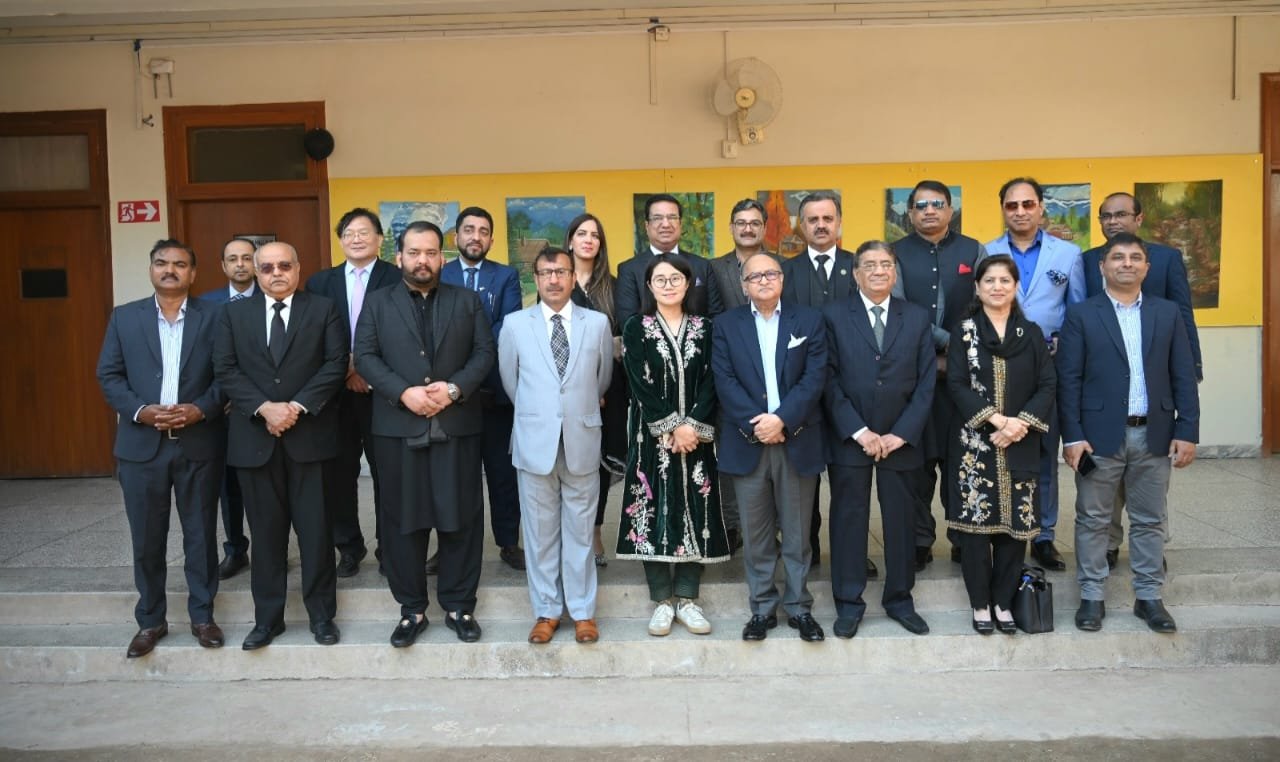by: TN Media News:
On February 22, 2024, Chinese Media Group (Islamabad Studio), School of Media & Arts, Foundation University of Science & Technology, Islamabad, and the Pakistan Research Centre for a Community with Shared Future (PRCCSF) organized a one-day international conference on “Role of Media in Enhancing the Global Connectivity through Belt and Road Initiative.”
The conference was aimed at learning about the core values of Chinese journalism exploring their impact on reporting standards and public discourse and exploring the proactive role of Chinese media in promoting Chinese culture to increase global awareness and understanding of the complex nuances of Chinese cultures. Chinese media actively emphasizes how the BRI promotes trade, attracts investment, and expands the markets of participating countries. The conference was moderated by Ms. Nishaat Ansar, Lecturer, Foundation University, Islamabad.
 The opening remarks were given by Brig (R) Dr. Abdul Ghafoor, Rector/Pro-Rector Foundation University, Islamabad. He thanked all the guests from China and other speakers for participating in the conference. He highlighted the role of Chinese media in promoting positivity, maturity, and constructive reality. He highlighted the establishment of a regional media connectivity center to conduct various joint projects, including conferences, training, and exchange learning programs, to achieve shared aspirations.
The opening remarks were given by Brig (R) Dr. Abdul Ghafoor, Rector/Pro-Rector Foundation University, Islamabad. He thanked all the guests from China and other speakers for participating in the conference. He highlighted the role of Chinese media in promoting positivity, maturity, and constructive reality. He highlighted the establishment of a regional media connectivity center to conduct various joint projects, including conferences, training, and exchange learning programs, to achieve shared aspirations.
Mr. Khalid Taimur Akram, Executive Director, Pakistan Research Center for a Community with Shared Future (PRCCSF), Islamabad, gave a speech on “Understanding the Various Facets of the Belt and Road Initiative within the International Landscape.” He stated that China’s willingness to collaborate with all parties demonstrates its commitment to achieving a prosperous, interlinked future across the world.
China seeks to foster an environment suitable for sustainable development and mutual prosperity. He discussed the prospects for regional countries to enhance connectivity and promote regional trade. The trade cooperation between China and a lot of countries is helping a transition towards a more equitable and interconnected global system, delivering stability, prosperity, and mutual advantage to regions.
 Dr. Hina Shahid, Head Department of Arts and Media, Foundation University, Islamabad, presented a speech on the role of media in constructing reality. She discussed the role of the media in framing reality. How news stories are presented, the language used, and the images portrayed significantly impact how we interpret events. She noted that it’s crucial to acknowledge that the media’s role in constructing reality is not inherently negative.
Dr. Hina Shahid, Head Department of Arts and Media, Foundation University, Islamabad, presented a speech on the role of media in constructing reality. She discussed the role of the media in framing reality. How news stories are presented, the language used, and the images portrayed significantly impact how we interpret events. She noted that it’s crucial to acknowledge that the media’s role in constructing reality is not inherently negative.
With its widespread reach and influence, the media possesses the potential to foster positive change and facilitate informed discourse. Responsible journalism, diverse representation, and critical media literacy are essential to harnessing the constructive power of media to promote understanding, empathy, and social justice. She highlighted that the Chinese media plays a crucial role in generating public support and enthusiasm for the Road & Belt initiative projects by increasing awareness and disseminating correct information.
Ms. Jianing Du, Bureau Chief, China Media Group (Islamabad Studio), Islamabad Office, presented a speech on “China-Pakistan Media Cooperation to Support the Development of the CPEC: Taking the CMG’s Communication Practice in Pakistan.” She introduced the work of the China Media Group when it was created, and its work conducts regular programs and video production. She discussed how to promote and strengthen media cooperation between China and Pakistan.
Dr. Wanchu Zhong, Distinguished Research Fellow at the Institute for a Community with Shared Future (ICSF), Communication University of China (CUC), Beijing, China, gave a speech on Initiatives Taken to Achieve Global Community Building within the Greater Eurasian Region. She highlighted the cross-continental cooperation framework and the infrastructural developmental project. She recommended regional cooperation in resolving global challenges such as climate change.
Mr. David Haruna Mrisho, Head of Department for Public Relations and Marketing, University of St. Augustine, Tanzania, gave a speech on Connectivity and Integration between Continents: Understanding Initiatives and Facilitations provided by BRI. He said the BRI is turning dreams into reality for a better future. He highlighted the policy coordination involved in making the continental connection.
 Mr. Sarmad Ali, Secretary General, All Pakistan Newspaper Society (APNS), presented a speech on “Conceptualizing the Belt and Road Initiatives through the Pakistani Lens.” He introduced his organization, the All Pakistan Newspaper Society. And how it has been a steadfast pillar of the Pakistani media landscape and has played a wide role in championing press freedom, journalistic integrity, and ethical reporting.
Mr. Sarmad Ali, Secretary General, All Pakistan Newspaper Society (APNS), presented a speech on “Conceptualizing the Belt and Road Initiatives through the Pakistani Lens.” He introduced his organization, the All Pakistan Newspaper Society. And how it has been a steadfast pillar of the Pakistani media landscape and has played a wide role in championing press freedom, journalistic integrity, and ethical reporting.
He noted that media cooperation plays a vital role in fostering communication and coordination, which is significant for promoting a positive image of China and global development cooperation. As we strengthen bonds of friendship and cooperation between the peoples of Pakistan and China, media cooperation has the potential to pave the way for a more interconnected and mutually beneficial relationship for generations to come.
Mr. Shahid Mehmood Khokhar, Chairman, Implementation Tribunal for Newspaper Employees (ITNE), presented an investigation of the connectivity initiatives between China, Pakistan, and BRI countries through the media’s lenses. He said that the critical role of the media sector in shaping public perceptions of connectivity projects cannot be overstated.
By providing a platform for diverse viewpoints, media outlets contribute to a more balanced debate on the merits and drawbacks of such initiatives. Whether through opinion pieces, editorials, or expert analysis, the media distils the complexity of these projects, enabling greater public awareness and participation.
Mr. Ashfaq Gondal, former Federal Secretary of Information, presented a speech on analyzing the geopolitical impact of the Belt and Road Initiative on the participating countries and the broader international community. He highlighted China’s role in pursuing good neighborhood policy and peaceful development with neighbors and the entire world. He discussed the overall progress of the China-Pakistan Economic Corridor (CPEC) and how China-Pakistan is making positive contributions to peace, progress, and development.
Dr. Adam Saud, Head of the Social Sciences Department, Bahria University, Islamabad, gave a speech on “Future Trends in Eurasian Cultural and Public Diplomacy Speakers.” He highlighted cultural diplomacy and the significance of promoting soft power.
Mr. Asim Khichi, Managing Director, Associated Press of Pakistan (APP), presented a speech on “Pakistan’s Media Role in Regional Connectivity through CPEC.”He highlighted the media’s great role in facilitating the dialogues and understanding between China and Pakistan, as well as the diplomatic efforts that the member states should make for the whole BRI.
Thus, by enabling the quick exchange of information, the media establishes a hospitable environment in which neighboring countries combine their efforts to resolve challenges. The role of Pakistani media in the current CPEC is as important as it once was. As we create the next phase of this transformational plan, the media should take strong leadership to inform, engage, and empower the population.
Concluding remarks made by Mr. Ovais Ali Khokhar, Chairman, Board of Experts, Pakistan Research Centre for a Community with Shared Future (PRCCSF), Islamabad. The Belt and Road Initiative (BRI) provides a new cooperative model to activate global economic development by creating a platform for dialogue, collaboration, and mutual benefit among all.
China’s pragmatic approach reflects its broader vision towards promoting global cooperation, dialogue, and mutual benefit, and connectivity remains committed to advancing not only regionalism but also internationalism. BRI is a pathway to a brighter, more interconnected future for all. This approach also fosters understanding, cultural exchange, and collaborative efforts to address pressing global issues like climate change, poverty alleviation, and public health.
In closing remarks, Dr. Hina Shahid, Head Department of Arts and Media, Foundation University, Islamabad, expressed her gratitude to the organizers, speakers, and attendees for contributing to a valuable and insightful conference.
On the sidelines of the conference, a Poster Exhibition titled “Belt & Road Initiative – A Journey towards a Prospective Future” was held, which was very highly successful. Students showcased and highlighted their artwork on the Belt & Road Initiative in the displayed exhibition. The winners were announced for the top ten participants who skillfully portrayed the theme and showcased their stories with remarkable results.
At the end of the conference, souvenirs were presented to all the speakers. The event was attended by 200 students from the university.





